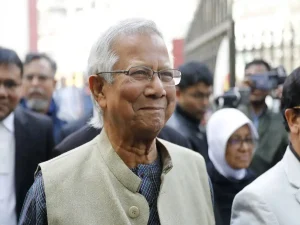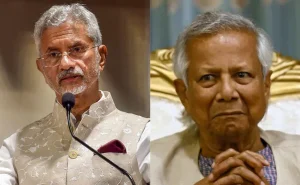New Delhi – A senior Bangladeshi official close to Chief Advisor Muhammad Yunus has made alarming statements threatening India’s northeastern region amid rising tensions following the Pahalgam terror attack. ALM Fazlur Rahman, chairperson of the National Independent Commission, suggested that Bangladesh warns northeast India invasion could be imminent if India takes military action against Pakistan.
Rahman’s controversial Facebook post, written in Bengali, explicitly stated, “If India attacks Pakistan, Bangladesh warns northeast India invasion will follow as we will have to occupy seven states of northeast India.” His statement has further strained the already tense relations between New Delhi and Dhaka.
The former Bangladesh Rifles head didn’t stop at threatening invasion but also suggested forming a military alliance with China to achieve this goal. “In this regard, I feel it is necessary to start discussions on joint military arrangement with China,” Rahman wrote, escalating concerns about regional security dynamics.
Timing of Northeast India Invasion Threat

The timing of this Bangladesh warns northeast India invasion statement is particularly significant as it comes when India is dealing with the aftermath of the Pahalgam terror attack that resulted in 26 casualties. Security experts view Rahman’s comments as an attempt to exploit a sensitive moment in India’s national security landscape.
Rahman’s threats come at a particularly delicate time as both countries have been working to repair bilateral relations that deteriorated significantly after former Prime Minister Sheikh Hasina sought asylum in India following political upheaval in Bangladesh. The Bangladesh warns northeast India invasion rhetoric directly undermines these reconciliation efforts.
India has expressed serious concerns about the reportedly targeted attacks against Hindu minorities in Bangladesh, which have further complicated diplomatic relations. The inflammatory statement about invading northeast India appears designed to provoke rather than promote regional stability.
Connection to Muhammad Yunus


Rahman’s proximity to Bangladesh’s Chief Advisor Muhammad Yunus gives these threats additional weight in diplomatic circles. As someone considered close to the current leadership, when Bangladesh warns northeast India invasion, it raises questions about whether these views have tacit approval from higher authorities.
This isn’t the first time concerns about Bangladesh’s stance on India’s northeastern states have emerged. During a visit to China in March, Muhammad Yunus made remarks about India’s “seven sisters” that raised eyebrows in New Delhi.
“The seven states of India, the eastern part of India, are called the seven sisters. They are a landlocked region of India. They have no way to reach out to the ocean,” Yunus had said. He described Bangladesh as the “only guardian of the ocean” in the region and suggested this geographical reality could be leveraged as “a massive opportunity, an extension of the Chinese economy.”
India’s Response to the Threats
While India has not officially responded to this specific Bangladesh warns northeast India invasion threat, past patterns suggest a firm diplomatic stance. When Yunus made his comments about the northeastern states in March, several leaders from India’s ruling BJP condemned the remarks.
India’s External Affairs Minister S. Jaishankar appeared to counter Yunus’s suggestion during an April BIMSTEC foreign ministers’ meeting, emphasizing, “Our northeastern region in particular is emerging as a connectivity hub for the BIMSTEC, with a myriad network of roads, railways, waterways, grids and pipelines.”


He added that India is “aware of its special responsibility” in the regional context. The Bangladesh warns northeast India invasion statement represents a significant escalation beyond previous diplomatic tensions.
Economic Retaliation Already Underway
Shortly after Yunus’s March comments about India’s northeastern states, New Delhi ended a nearly five-year-old arrangement that had allowed trans-shipment of Bangladeshi export cargo to third countries via Indian airports and ports. While officially attributed to “increasing congestion for cargo traffic,” many analysts viewed this as a diplomatic response to Bangladesh’s rhetoric.
This economic action demonstrates India’s willingness to use its leverage when provoked, raising concerns about what additional measures might follow if the Bangladesh warns northeast India invasion narrative continues to escalate from Dhaka.
Regional Security Implications
The suggestion that Bangladesh warns northeast India invasion would involve cooperation with China adds a concerning geopolitical dimension to the threat. China’s increasing influence in South Asia has been a strategic concern for India, and the suggestion of a Bangladesh-China military arrangement specifically targeting India’s northeastern region represents a significant security challenge.
Security analysts note that when Bangladesh warns northeast India invasion, it potentially signals broader realignment in regional alliances. The explicit mention of China’s involvement suggests Rahman may be testing waters for a more China-aligned Bangladesh foreign policy under the current administration.
Broader Context of Indo-Bangladesh Relations
The recent deterioration in Indo-Bangladesh relations provides important context for understanding why Bangladesh warns northeast India invasion rhetoric has emerged. After Sheikh Hasina fled to India seeking asylum, the new interim government under Muhammad Yunus has taken several positions that appear to distance Bangladesh from India.
There have been allegations of targeted violence against Hindu minorities in Bangladesh, which have deeply concerned Indian authorities. These developments, combined with the Bangladesh warns northeast India invasion threat, suggest a potentially significant shift in Bangladesh’s foreign policy orientation.
Pahalgam Attack as the Trigger
The Pahalgam terror attack that killed 26 people serves as the immediate backdrop for Rahman’s comments. His statement explicitly connects any potential Indian retaliation against Pakistan to Bangladesh’s threatened actions against northeast India.
When Bangladesh warns northeast India invasion in this context, it effectively positions Bangladesh as aligned with Pakistan in the regional security dynamic. This represents a significant departure from the traditionally more balanced approach Bangladesh has historically taken between India and Pakistan.
Final Word
The statement that Bangladesh warns northeast India invasion if India attacks Pakistan represents a significant escalation in regional tensions. Coming from an official close to Muhammad Yunus, these comments cannot be easily dismissed as merely personal views.
As India continues to address the aftermath of the Pahalgam terror attack while simultaneously managing complex regional relationships, this new threat from Bangladesh adds another layer of complexity to South Asian geopolitics. The explicit suggestion of partnership with China further complicates the strategic landscape.
Regional stability now depends on careful diplomatic navigation by all parties involved and clarification from Bangladesh’s leadership about whether these views represent official policy or merely the personal opinions of a single, albeit influential, official.

